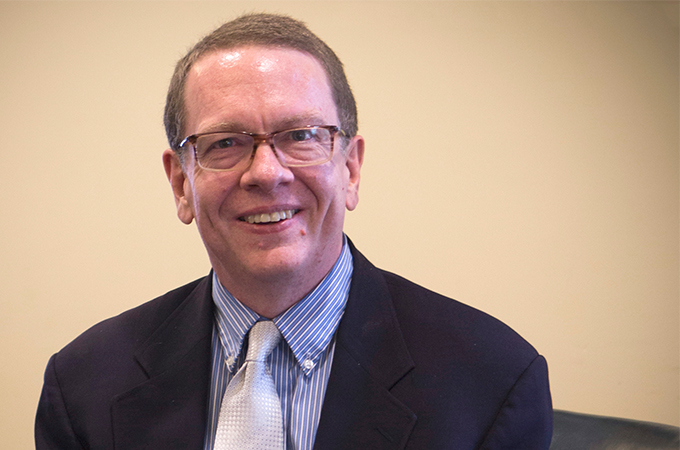The University of Redlands’ editorial team caught up with Rev. Jon L. Berquist, Ph.D., who has served as visiting professor of Old Testament at San Francisco Theological Seminary (SFTS) since 2014, about worship and pastoral care in a time of pandemic, how faith communities can look to the past to handle the future, and the ways churches can strive to meet the needs of the communities within which they exist.
Bulldog Blog: You’re teaching a Doctor of Ministry course, Biblical Images for the Emerging Church. What is your context for teaching this class at this time?
Berquist: The course asks, “What are some ways we can think about the church in fresh ways that are still faithful to biblical texts?” The Bible represents faith communities across multiple continents, over nearly 2,000 years, and covers a wide variety of different situations. Sometimes we read the Bible as if it adds up into one right way to run the church that’s supposed to last forever. But the Bible is the story of change over time to fit into different situations.
Sometimes our best source of innovation is to see what has been tried in the past, particularly in our shared heritage. The book of Psalms is really a hymnal, and singing together is a powerful force, but that’s not as safe now so we turn to other settings. The book of Proverbs was handed down from one person to another, so we have models for shared wisdom among large groups, but also for spoken word that’s one-on-one. Many early New Testament churches were house churches with maybe as few as a dozen people involved, most of whom would be living together or living right next to each other. This becomes a model for a church that we can have in the pandemic environment.
BB: You teach a course called The Bible in an Age of Pandemic. How do you approach its content?
Berquist: The connection between the Bible and health has interested me for years. There are parts of the book of Leviticus that describe people sharing details about their physical symptoms with their priest. It is not that long ago that health care was seen as something the religious community was responsible for providing. I certainly don’t think that pastors can replace our medical doctors, but we need to have a better sense of the health responsibilities of our communities and the healing potential of our scripture and faith.
The pandemic is certainly a health crisis, but at the same time, and probably longer lasting, a mental and spiritual health crisis, and we need the wisdom of our traditions to be part of that solution.
One of the lessons we should be taking from the pandemic is that health is not an individual concern; health is a public concern for our whole community, and that includes physical, mental, and spiritual health. There’s a very consistent biblical message that children, the elderly, women, and immigrants are particular groups that need our caring attention as part of protecting the health of the whole.
BB: As we look into the future, how can we draw on the past for insights?
Berquist: For me, it’s important to remember that we’re not alone. It’s too easy to think that the pandemic or the challenges of today, however you define them, are challenges that nobody else has ever faced, and we have to figure it out on our own. There’s a responsibility to respond to the needs of the day in the particular ways that today requires, but we’re also part of a very long tradition that the Bible would call a “great cloud of witnesses,” people who have been innovating for their day and adapting to their specific contexts for thousands of years.
BB: What do you look forward to for our communal future?
Berquist: We’re hearing from some experts that there is a spiritual resurgence because the pandemic is breaking some habits and giving us a chance to rethink what is really important in our lives. It’s an opportunity to focus on areas of enduring value, to recommit ourselves to very human needs and practices, to recommit to each other. It’s my hope that we look back at this era and view it not as such a divisive time, but as a time where we see that we are all in this together, and that we need an even stronger sense of community, faith, and commitment.
Learn more about SFTS and the U of R Graduate School of Theology.
Editor’s Note: A version of this article first ran as part of the cover story of Chimes magazine, paired with an interview with Marcia McFee, a visiting professor of liturgical studies and the Ford Chair for Congregational Studies at SFTS.






